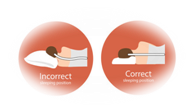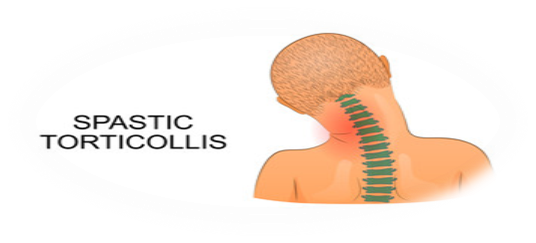That stiff neck is killing you and you probably are thinking what went wrong while you were sleeping!
Waking up with neck pain or a sore neck is certainly not a good way to start the day. It can quickly put you in a bad mood and make simple movements painful, such as turning your head.
Most sore necks are caused by your sleeping position, the type of pillow you use, or other sleep issues.
You may not think much about your sleeping position or the type of pillow you use but they do matter a lot. Your sleeping position and pillow can both cause a stiff, sore neck, as well as back pain, and other types of pain.
According to research, waking up with neck pain is directly associated with sleeping problems. And hence, this may be the cause of up to 5% of new cases of chronic pain. However, you may control many of these factors, which means that you may be able to get rid of your neck pain by making some changes
Incorrect Sleeping Position

Everyone has a favourite sleeping position. However, if it’s your stomach, you are not doing any favors to your neck. When sleeping on your stomach, your neck may be twisted to one side for several hours at a time. This can strain your neck muscles, making them sore and stiff in the morning. Tummy sleeping can also be hard on your back, especially if you sleep on a mattress that isn’t very supportive and result in waking up with neck pain. As a result, your belly sinks into the bed, putting stress and pressure on your spine and back muscles
Change your mattress every 7 years so that you do not have to sleep on saggy or uneven mattresses that adversely affect your spine health.
Abrupt movements

Abrupt or sudden movements such as jerking up or flinging your limbs around in a dream can strain your neck muscles. Tossing and turning while sleeping or attempting to sleep can also cause neck tension and stress.
Certain Injuries

Some injuries, such as whiplash or sports injuries, may not be painful at first. However, the full physical effects may not be felt for several days. For example, if you hurt your neck somehow, you may go to bed feeling fine but may end up waking up with neck pain or a very sore neck the next morning.
Bad Posture

Working on a computer for long hours or watching television for too long without changing positions causes poor posture during the day. Due to this, your neck gets stiff, and you may wake up with an achy neck the following day.
Osteoarthritis of the neck

Osteoarthritis is another reason for waking up with neck pain in the morning. Because of a herniated disc or bone spur, there is compression on the upper spinal joints nerve in the neck.
A further breakdown of reasons for waking up with neck pain in the morning

The spine is more than just its parts. It has to be strong because it keeps you upright and moving while fighting gravity and other forces that act on it almost constantly. However, its individual parts can be surprisingly delicate, particularly in the neck, also known as the cervical spine.
The cervical spine performs an important function: it supports and holds your head.
The human head approximately weighs 10 to 12 lbs with perfect posture—as much as a bowling ball. But, according to a 2014 study paper published in Surgical Technology International, a 60-degree tilt can increase the effective weight of the head to up to 60 lbs!
With all that weight, the muscles that support your head and neck must work overtime, and all that work results in tired muscles. That’s one of the puzzle pieces. Add misalignment while you’re supposed to be resting, and you’ve got Torticollis.
Torticollis (wry neck) is a spine condition in which the neck twists or tilts at an odd or funny angle. This is a common cause of irritated ligaments or tissues and spasms of neck muscles.
Therefore, as the above explanation indicates, this spinal condition too contributes to waking up with neck pain.
How can you resolve early morning neck pain?
Heat or ice therapy method
Applying ice immediately after a neck strain may help reduce swelling. Ice applications are most effective for 10 to 20 minutes at a stretch. Heat therapy, including a warm shower or using a heating pad, aids in the loosening and relaxing of muscles, which may also help to reduce pain and improve range of motion.
Pain relievers over-the-counter.
Sometimes waking up with neck pain can turn severe and may also limit your movements in one or more directions. During such situations, an over-the-counter medication may be recommended. Ibuprofen, naproxen, and acetaminophen are a few examples.
Self-massage or gentle stretching
After achieving some initial pain relief, stretching or massage can be an option to further loosen the muscles and ligaments. Some stretches cannot be performed in full form due to neck pain and stiffness, which is fine. The goal is to increase flexibility while minimizing pain gradually. Furthermore, as long as it does not increase pain, the hand and fingers can be used to massage the sore area of the neck.
Pain evaluation and activity modification
After waking up with neck pain and a while of being awake, and applying these stiff neck remedies, try assessing whether the pain and stiffness are improving.
Our spine specialist Dr. Saijyot Raut suggests that if your neck stiffness still prevents significant movement in any of the directions, or if sharp or burning pain persists, it is best to avoid strenuous activities for the day and limit movements that aggravate pain.
Pro Pillow and other tips to prevent waking up with neck pain

We often tend to shun the importance of pillows in our sleep regime. However, the way everyone has a different sleep pattern; similarly not one pillow is apt for every individual out there. To avoid waking up with neck pain, follow these guidelines for selecting the proper pillow based on your preferred sleeping position that supports your back curve and neck to help relieve stress on your neck:
For Back Sleepers

A thin pillow may be beneficial to back sleepers. To see if a pillow is right for you, lie down on it and have a family member or friend photograph the curve of your neck. The curve of your neck should ideally resemble that of when you are standing with a good posture (standing straight with your head up and shoulders back).
For Side Sleepers

Side sleepers will generally require a thicker pillow than back sleepers in order to keep the neck and head in the middle of the shoulders. Your height and shoulder width will help determine the type of pillow you should buy—for example, if you’re petite, you’ll need a slimmer pillow than if you’re broad-shouldered.
Avert sleeping on one particular side every day. Keep changing sides intermittently.
For Stomach Sleepers

Stomach sleepers may benefit from an ultra-thin pillow or from not using a pillow at all if you really want to bypass the discomfort of waking up with neck pain. Sleeping on the stomach puts more strain on the cervical spine than other sleep positions, so some people may prefer to avoid it.
No phone before going to bed
With electronic devices dominating our lives, people now have developed the habit of using their phones even before going to sleep. While doing this, you need to lower your heads to look at your phones for texting or surfing the web. Thus, the cervical spine is subjected to up to 60 pounds of force as you bend your head forward. So, too much time spent looking down at the phone may cause neck pain, also known as text neck.
Regular exercise is essential
Physical activity can help your muscles, including those in your neck, to become stronger. It can also help you improve your posture and relieve stress, which can lead to stiff muscles. Also, stretching your neck a bit before you go to sleep can help avoid waking up with neck pain.
When should you visit our Ortho expert?
Consult with our spine expert Dr. Saijyot Raut if your neck pain interrupts your sleep for more than a week. Besides, if you are experiencing headache, fever, chest pain, shortness of breath, a lump in your neck, pain that radiates down your arms or legs, or anything that seems to be extremely abnormal, visit the doctor at once.
Dr. Saijyot being a qualified medical professional recommends a comprehensive treatment plan to help reduce neck pain as much as possible. He ensures to deliver you a physically painless and healthy spine life with utmost care and compassion. So book an appointment whenever you need to.

Dr. Saijyot Raut







